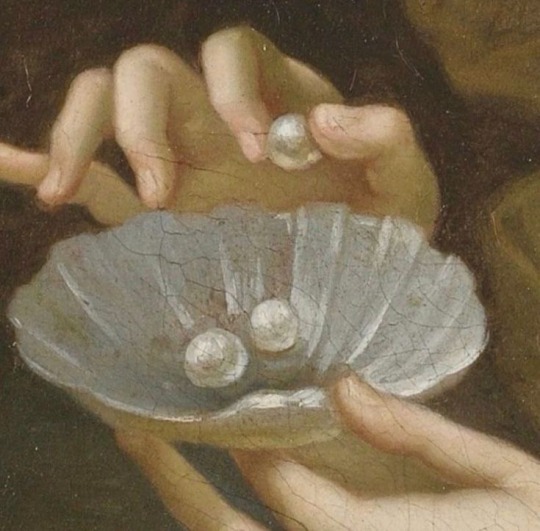#tafsir
Explore tagged Tumblr posts
Text
“…and let them pardon and overlook. Would you not like that Allāh should forgive you? And Allāh is Forgiving and Merciful.”
— Quran, 24:23
This ayah was revealed for Abu Bakr As-Siddiq رضي الله عنه when he said he wouldn’t financially help his poor maternal cousin Mistah bin Uthathah, after Abu Bakr رضي الله عنه found out it was Mistah who slandered Aisha رضي الله عنه for indecency.
When this ayah was revealed, Abu Bakr As-Siddiq رضي الله عنه reportedly said, “Of course, by Allah, we love -- O our Lord -- that You should forgive us.” Abu Bakr رضي الله عنه started supporting Mistah again and said, “By Allah I will never stop spending on him.”
(Source: Tafsir Ibn-Khatir)
This ayah will take you a long way in your life. We all have been harmed by others. If Allah wanted Abu Bakr As-Siddiq رضي الله عنه to forgive his cousin who slandered his daughter in such an evil way, surely Allah would want you to forgive those who harmed you in a much lesser way. If Abu Bakr رضي الله عنه can forgive Mistah, surely you can forgive others too. Who would not want to receive Allah’s mercy and forgiveness?
22 notes
·
View notes
Text
﴿رَفيعُ الدَّرَجاتِ ذُو العَرشِ يُلقِي الرّوحَ مِن أَمرِهِ عَلى مَن يَشاءُ مِن عِبادِهِ لِيُنذِرَ يَومَ التَّلاقِ﴾ [غافر: 15]
[فهو أهل لأن يُخْلَص له الدُّعاء والطّاعة :) فهو: رفيع الدرجات مباين لجميع خلقه، وهو رب العرش العظيم، ينزل الوحي على من يشاء من عباده ليَحْيَوا هم ويُحْيُوا غيرهم ')) وليخوّفوا الناس من يوم القيامة الذي يتلاقى فيه الأولون والآخرون.] — المُختصر في تفسير القرآن الكريم
(15) [He is] the Exalted above [all] degrees, Owner of the Throne; He places the inspiration of His command [i.e., revelation] upon whom He wills of His servants to warn of the Day of Meeting. [Saheeh International] [For He is worthy of sincere supplication and obedience, as He is elevated in ranks, separate from all of His creation. He is the Lord of the Great Throne. He sends revelation upon whomever He wants from His slaves so that they and others become alive. He warns people of the Day of Resurrection, in which the people from the start of time until the end will all meet one another.] — Al-Mukhtasar fi Tafsir Al-Qura'n Al-Karim
#قرآن كريم#قرآن#quran kareem#quran#holy quran#islamicreminders#تذكير#reminder#quran verse#quran ayah#tadabbar#listen to quran#quran recitation#وذكر#آية من القرآن#ذكر الله#تدبرات قرآنية#تفسير القرآن#تلاوة القرآن#تلاوة خاشعة#استمع إلى القرآن#تفكَّر#تدبَّر#tafsir#zikr allah#tafseer#kuranıkerim#kuran ayeti#kuranikerim#الذِّكر الحكيم
9 notes
·
View notes
Text
Jangan kau ambil tangisan ini
Jika hanya ini yang kau bagi
Jangan keringkan air mataku
Jika dengan-Nya kubisa menatapmu..
_______________________________
Lagi suka sama lagu-lagunya mas Panji Sakti ini. Isinya penuh perenungan antara hubungan hamba dan Rabbnya..
Iya.. Allah, kalau memang dengan momentum kesedihan dan kegamangan menjadi cara untuk terus ada dan makin dekat denganMu, gapapaa yaa Allah.. gapapaaa.. diri ini ikhlas.. Karena kalau dengan kesenangan, aku masih belum tahu responku seperti apa, bahkan mungkin akan terlena.. :')
12 notes
·
View notes
Text

قال الإمام عبد الرحمن بن ناصر السعدي رحمه الله تعالى:
فإن العبد إذا أصابته مصيبة فصبر وثبت، ازداد بذلك إيمانه، ودل ذلك على أن استمرار الجزع مع العبد دليل على ضعف إيمانه.
[ تفسير السعدي | سورة القصص، آية ١٠]
Al-Imām ‘Abdur-Raḥmān ibn Nāṣir As-Si’dī, may Allāh have mercy upon him:
“Verily, if a calamity befalls the slave and he is patient and stays firm, his Īmān increases, and this proves that the slave constantly being in a state of worry is a sign of the weakness of his Īmān.”
[Tafsīr As-Si’dī, Surah Al-Qaṣaṣ (10)]
#islamic quotes#sayings of the salaf#salafiyyah#islam#manhaj salaf#أقوال السلف#sunnah#آثار السلف#islamic knowledge#quran#الإيمان#الصبر#القدر#تفسير السعدي#تفسير القرآن#islamic post#islamic#quraan#tafsir
54 notes
·
View notes
Text
Quranic Arabic help
I have a tafsir related question. So the term "Ulul al Baab" means people of the intellect and "Lubb" means intellect/heart/sound heart/sound mind. But is there any relation to the Arabic word for door here coz I first thought of that when I saw Baab. So is the Baab in this phrase only related to intellect/sound heart or also to the word for door?
6 notes
·
View notes
Text
Welcome to farina’s archive



some of my interests
- Islam 🌙
-Tafsir
- classic literature
- art
-philosophy
- manifestation
- Well-being
-law of attraction
-anime (one piecee ) + kdrama
- UFC, F1,K1 (sporty gyal)
#law of assumption#tryna build a community of smth#manifestation#islam#i’m just a girl#philosophy#law of attraction#one piece#coquette#mutuals?#motivation#classic#literature#vintage#vinyl records#girlblogging#girl support girl#positivity#ufc#kickboxing#formula 1#carlos sainz#formula one#thewizardliz#persphonesmind.
24 notes
·
View notes
Text
Tafseer Gem | Ayah 29:69
“As for those who strive hard in Us (Our Cause), We will surely guide them to Our Paths.” • [al-Qur’an 29:69]
al-Baghawi Rahimahullah said: “Those who strive to aid the Deen against Mushrikeen.”
Sufyan b. ‘Uyaynah Raḥimahullāh said: “Striving with patience upon obedience (to Allah).”
al-Hasan al-Basri Rahimahullah said: “Best striving is to oppose the desires.”
Fudayl b. ‘Iyad Rahimahullah said: “Those who strive in seeking knowledge, they are guided to the paths of action through it.”
Sahl b. ‘Abdullah Rahimahullah said: “Those who strive to establish the Sunnah (of Messenger ﷺ), they are guided to the path of Jannah.”
● [تفسير البغوي]
#islam#quote#allah#hijab#knowledge#inspirational quotes#islamicadvice#islam4 life#jilbab#la ilaha illa allah#islamicreminders#islamicart#islamic advice#islamicquotes#islamic#muslim revert#muslimah#muslim reminder#muslim#quranic#quran online#holy quran#quran#quraan#quran ayah#deenbot#deenislam#deenoverdunya#deen#tafsir
11 notes
·
View notes
Text
Natural Love
From Ibn Ṭāwūs, from his father, regarding Allah's statement: {those who have no physical desire} [24:31], (Ṭāwūs) said: “It refers to al-aḥmaq (ie: the fool) who has no need or desire for women.” نا عَبْدُ الرَّزَّاقِ قَالَ: أرنا مَعْمَرٌ، عَنِ ابْنِ طَاوُسٍ، عَنْ أَبِيهِ فِي قَوْلِهِ تَعَالَى: { غَيْرِ أُولِي الْإِرْبَةِ} [النور: 31]، قَالَ: «هُوَ الْأَحْمَقُ الَّذِي لَيْسَ لَهُ فِي النِّسَاءِ حَاجَةٌ وَلَا أَرَبٌ» ʿAbd al-Razzāq al-Ṣanʿānī, Tafsīr 2/436 #2032 عبد الرزاق الصنعاني، تفسير ٢/٤٣٦ #٢٠٣٢ https://shamela.ws/book/21791/2001 @ilmtest [https://t.me/ilmtest]
#islam#islaam#islamic#islaamic#muslim#salafi#salafiyyah#salaf#desires#tafsir#tasfeer#men#women#attraction
11 notes
·
View notes
Text
Dunia Tempatnya Lelah
Bukan dunia kalau nggak lelah. Beramal baik capek, tapi melakukan perbuatan buruk juga capek. Mana yang kamu pilih?
أفلا تتفكرون
"apakah kamu tidak berpikir"
Sedangkan Allah akan membalas kesabaranmu dalam beramal Sholeh (melaksanakan perintahnya dan menjauhi larangan-Nya secara konsisten) di dunia dengan kenikmatan berupa surga. Bahkan karena kesabaranmu, para malaikat akan menyambutmu dengan sebuah penghormatan (QS. Ar-Ra'd : 24)
Lelah gpp asal hadiahnya surga 🤲🏻
Sumber: tafsir Ibnu al-Jauzi
2 notes
·
View notes
Text
গায়ক ও গানের শ্রোতা কি কাফের? | Singers and music listeners are infidels?
youtube
#youtube#trending#for you#viral trends#shorts#viral video#youtube shorts#youtube users#youtube viral#youtuber#islamic quiz#islamic#islam daily#islamdaily#islam#waz 2024#new waz#waz mahfil#bangla waz#wazifa#tafseer#tafsir#madrasa#quran#holy quran#quran ayah#quran kareem#quraan#hadith
3 notes
·
View notes
Text
Thoughts of the week #2!
The Quran is such a beautiful daily reminder of how to live life and have tawaakul.
Today was a difficult day and every single prayer felt like a struggle but I randomly saw myself repeating ayahs from the surah ar-rahman (one of my favourite surahs by the way one that I struggle not to actively cry whenever reading)
It started with this Ayah below

Subhannallah how merciful is the most high that at times when I’m struggling the most my subconscious is reminding me that who am i to deny fufilling my obligations to the lord who has continuously shown me favour?
Then as I started to thinking of skiving off and just doing the very bare basic minimum of work because it has been a rough couple of weeks the ayah below keeps repeating in my head also from surah ar-rahman

Now mind you I don’t know my tafsiir like that. So i did not know instantly what it meant like the previous ayah which repeats so much in the surah and in a lot of lecture that I’ve memorised it. This one I had to look up.
Luckily tarteel has the function to search by just reading which was perfect. I found it and was flabbergasted. And it did hurt my conscious slightly because it felt like a light had been thrown on to my petty thoughts. But who am I to skive off and give in short measure when I have been directed not to?
I remember listening to a lecture during ramadan that said how much of a blessing it was if you just see yourself humming the quran or just remembering random ayahs and ever since then I have felt incredibly blessed.
And from now on I will definitely start to look for tafsiirs of ayahs stuck in my head because the two above have just been such perfect examples of guidance that I know i certainly could not deny them.
5 notes
·
View notes
Text
Berikut adalah pengertian "perkataan yang baik" dari masing-masing ayat dalam konteks yang berbeda, serta cara mengamalkannya di zaman sekarang.
1. Surah An-Nisa Ayat 5
Pengertian: Qawlan Ma'rufâ merujuk pada ucapan yang penuh kelemahlembutan dan kebaikan, di mana seseorang diharapkan menggunakan lisannya untuk kebaikan, tidak menyakiti atau merugikan orang lain.
Pengamalan di Zaman Sekarang:
Contoh 1: Saat berbicara di depan umum, gunakan bahasa yang positif dan tidak merendahkan.
Contoh 2: Dalam percakapan sehari-hari, hindari mengkritik atau menjelekkan orang lain.
Contoh 3: Mendorong orang lain dengan kata-kata semangat dalam situasi sulit, seperti saat ujian atau menghadapi masalah.
---
2. Surah An-Nisa Ayat 9
Pengertian: Qawlan Sadîdâ di sini berkaitan dengan niat baik dalam berdoa dan berinteraksi, terutama dalam konteks keluarga dan masyarakat.
Pengamalan di Zaman Sekarang:
Contoh 1: Mengadakan doa bersama keluarga sebelum melakukan aktivitas penting.
Contoh 2: Mengingatkan teman untuk tidak berbicara buruk tentang orang lain dengan cara yang halus.
Contoh 3: Berdoa untuk kesejahteraan orang lain, termasuk orang tua dan saudara.
---
3. Surah An-Nisa Ayat 63
Pengertian: Qawlan Balîghâ adalah ucapan yang dapat membimbing dan membawa kebaikan, serta mencerminkan keinginan untuk mengajak orang kepada kebaikan.
Pengamalan di Zaman Sekarang:
Contoh 1: Memberikan nasihat yang membangun kepada rekan kerja yang menghadapi kesulitan.
Contoh 2: Mengedukasi orang lain tentang isu-isu sosial dengan cara yang positif.
Contoh 3: Menggunakan media sosial untuk menyebarkan informasi yang bermanfaat dan inspiratif.
---
4. Surah Al-Isra Ayat 23
Pengertian: Qawlan Karîmâ mencerminkan rasa hormat dan kasih sayang, terutama dalam berkomunikasi dengan orang tua.
Pengamalan di Zaman Sekarang:
Contoh 1: Selalu berbicara dengan sopan kepada orang tua, misalnya saat mendiskusikan keputusan hidup.
Contoh 2: Mengungkapkan rasa syukur secara langsung kepada orang tua setiap kali mereka membantu.
Contoh 3: Mendengarkan cerita orang tua dengan penuh perhatian, tanpa menginterupsi.
---
5. Surah Al-Isra Ayat 28
Pengertian: Qawlan Maysûrâ berarti menjaga sikap positif dan lembut dalam komunikasi, terutama saat menghadapi kesulitan.
Pengamalan di Zaman Sekarang:
Contoh 1: Saat mengalami masalah di tempat kerja, berbicaralah dengan tenang kepada atasan.
Contoh 2: Memberi dukungan kepada teman yang sedang down dengan kata-kata yang optimis.
Contoh 3: Menghadapi situasi konflik dengan berusaha menemukan solusi melalui dialog yang baik.
---
6. Surah Thaha Ayat 44
Pengertian: Qawlan Layyinan berkaitan dengan berbicara dengan bijaksana dan lembut, bahkan kepada lawan.
Pengamalan di Zaman Sekarang:
Contoh 1: Menghadapi kritik dari orang lain dengan jawaban yang menghormati pendapat mereka.
Contoh 2: Mengadakan diskusi terbuka tentang isu-isu yang sensitif tanpa menyinggung perasaan orang lain.
Contoh 3: Menghadapi perbedaan pendapat dalam pertemuan dengan cara yang penuh hormat.
---
7. Surah Al-Muzammil Ayat 5
Pengertian: Qawlan Tsaqîlâ dalam konteks ini berarti menggunakan ucapan yang penuh hikmah dan bijaksana, terutama dalam dakwah.
Pengamalan di Zaman Sekarang:
Contoh 1: Menggunakan platform online untuk menyampaikan pesan positif dan dakwah dengan cara yang menarik.
Contoh 2: Menerapkan komunikasi yang baik dalam kelas atau kelompok diskusi saat membahas topik agama.
Contoh 3: Memberikan contoh nyata dalam tindakan sehari-hari, sehingga kata-kata yang diucapkan selaras dengan tindakan.
===
Kesimpulan
Pengertian "perkataan yang baik" dalam konteks ayat-ayat ini beragam, tetapi inti utamanya adalah berbicara dengan kasih sayang, hikmah, dan positif. Menerapkannya dalam kehidupan sehari-hari dapat memperbaiki hubungan dan menciptakan suasana yang harmonis di lingkungan keluarga, masyarakat, dan tempat kerja.
---
#grateful#gratitude#quraan#quran#quran kareem#exegesis#tafsir#sharing is caring#passion#love#self love#self care#good deeds#goodness#cinta#belajar#catatan
3 notes
·
View notes
Text
"فَإِنّي قَريبٌ"
قال ربُّنا تبارك وتعالى: ���وَإِذا سَأَلَكَ عِبادي عَنّي فَإِنّي قَريبٌ أُجيبُ دَعوَةَ الدّاعِ إِذا دَعانِ فَليَستَجيبوا لي وَليُؤمِنوا بي لَعَلَّهُم يَرشُدونَ﴾ [البقرة: 186] [(186) And when My servants ask you, [O Muḥammad], concerning Me - indeed I am near. I respond to the invocation of the supplicant when he calls upon Me. So let them respond to Me [by obedience] and believe in Me that they may be [rightly] guided.]
”وإذا سألك -أيها النبيّ- عبادي عن قربي وإجابتي لدعائهم؛ فإنيّ: قريب منهم، عالم بأحوالهم، سامع لدعائهم، فلا يحتاجون إلى وسطاء، ولا إلى رفع أصواتهم، أُجيب دعوة الداعي إذا دعاني مخلصًا.. في دعائه، فلينقادوا لي ولأوامري، وليثبتوا.. على إيمانهم؛ فإن ذلك أنفع وسيلة لإجابتي، لعلهم يسلكون بذلك سبيل الرشد في شؤونهم الدينية والدنيوية.“ — المُختصر في تفسير القرآن الكريم “If they ask you, O Prophet, about how close Allah is and about His answering of prayers, Allah is close to them and knows everything about them. He hears their prayer, and they do not need intermediaries to raise their voices. Allah responds to the call of whoever calls Him sincerely, praying to Him; so, let them be devoted to Him and His sacred law, firm in their faith, as that is the best route to Allah’s response – perhaps in that way, they might be rightly guided in worldly and sacred matters.” — Al-Mukhtasar
#holy quran#قرآن كريم#قرآن#quran kareem#quran#islamicreminders#تذكير#reminder#quran verse#quran ayah#tafseer#tafsir#quran recitation#zikr allah#tadabbar#تلاوة هادئة#تلاوة خاشعة#تلاوة الشيخ عبد الباسط عبد الصمد#تلاوة القرآن#آية من القرآن#آية قرآنية#تفسير القرآن#listen to quran#kuran ayeti#kuranıkerim#kuranikerim#ذكر الله
8 notes
·
View notes
Text
Tafsir al-Ayyashi 1

Commentary Below The Cut:
"G'd As The Golden Calf".
I realize it's a strange phrase. The calf wasn't G'd, but an idol created by the Israelites who became restless in the absence of their prophet (PBUH). However, idolatry doesn't come purely from malicious disobedience; rather, it stems from an instinctive need to see what is unseen.
In order to understand that which is ineffable, humans developed metaphors and images to aid their limited minds. They produce scriptures, statues, and symbols, which occasionally aid in spiritual pursuits but also impedes in the discovery of the ultimate truth. The idea of "thingness" they convey distracts from G'd's (SWT) mysterious nature.
لَّا تُدْرِكُهُ ٱلْأَبْصَـٰرُ وَهُوَ يُدْرِكُ ٱلْأَبْصَـٰرَ ۖ وَهُوَ ٱللَّطِيفُ ٱلْخَبِيرُ
"No vision can encompass Him, but He encompasses all vision. For He is the Most Subtle, All-Aware."
I want to focus on the verse, "and through their disbelief, they were made to drink [the love of] the calf deep into their hearts," in reference to the Golden Calf. An idol cannot love. It is a lifeless representation of disobedience. Then why is "love" written there? For G'd, who resides in the calf, is the source of the love, not the statue. G'd hides Himself in the mundane, but Sakinah—the glory and peace of G'd— will always be felt and It's up to us to recognize where Idol ends and G'd starts. G'd put the Israelites to the test, not only to see if they would worship idols while Mūsā (RA) was away but also to see if they could still acknowledge Him in the midst of their zeal.
#god#moses#islam#islampost#tafsir#tawil#esoteric#idolatry#religious commentary#religious study#biblical#quran#religion#exodus
3 notes
·
View notes
Text
وَخُلِقَ ٱلْإِنسَٰنُ ضَعِيفًۭا
"Man was created weak"
● [4:29]
Ibn 'Abbās رضي الله عنهما commented:
"This is because men are unable to stay away from women and intercourse..."
Tawus commented on this saying:
"This verse is regarding women."
Waki' commented on this saying:
"A man's mind leave when women are involved."
● {تفسير ابن عباس، تفسير ابن كثير}
12 notes
·
View notes